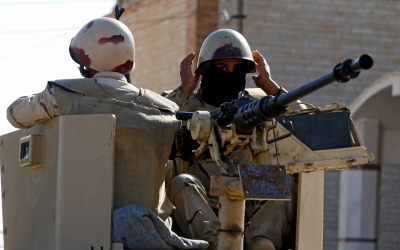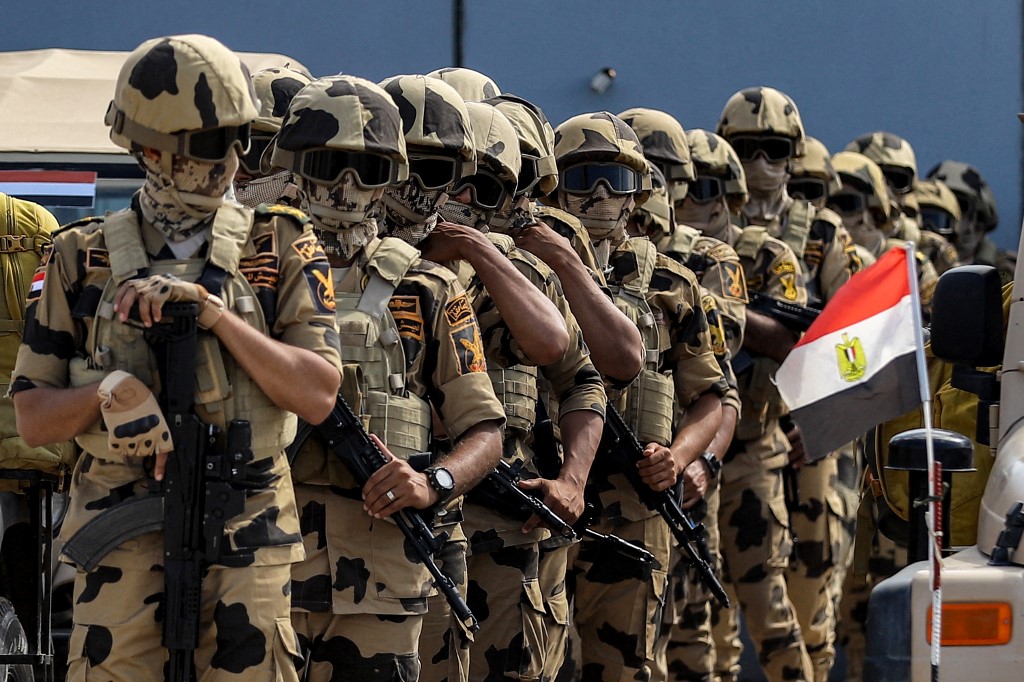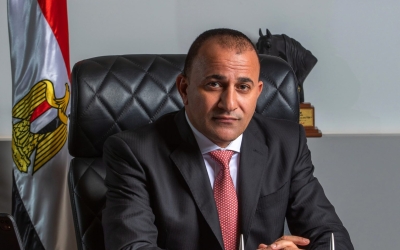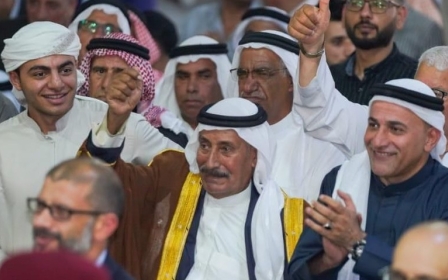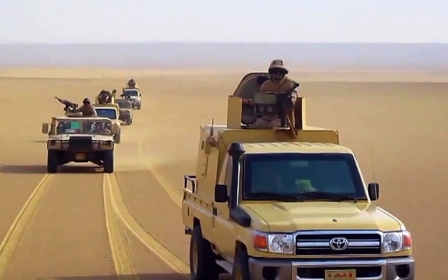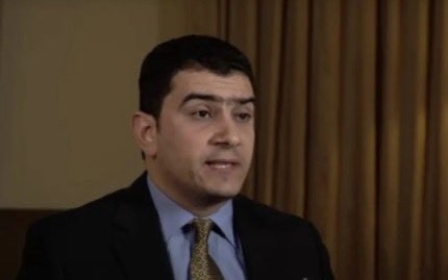Egypt: How Sinai became a graveyard for education in ten years under Sisi
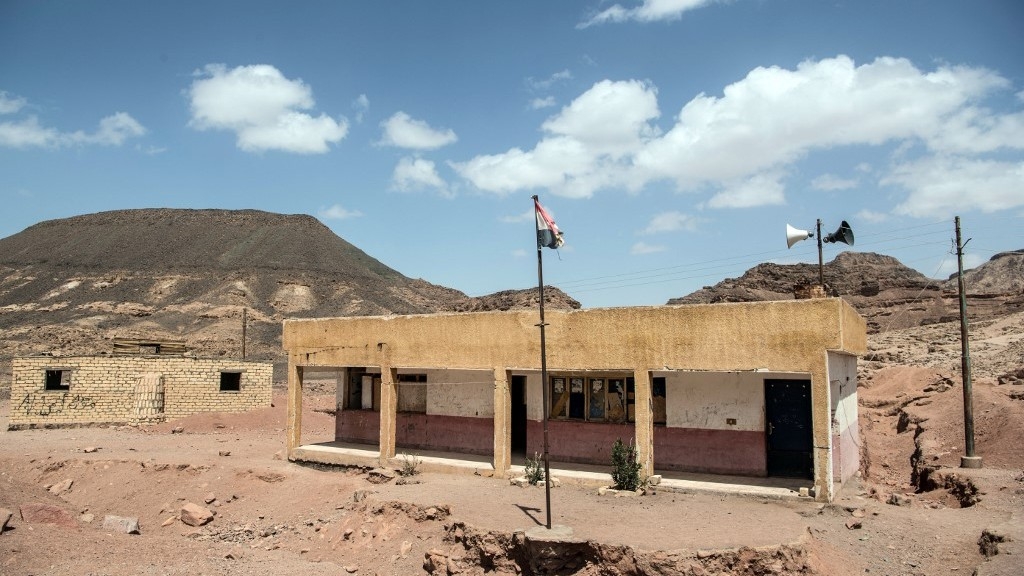
Egyptian army and security forces have destroyed dozens of schools and killed 186 students and 21 teachers during the decade-long conflict with Islamic State militants in Sinai, a report has revealed.
Between 2013 and 2023, the Sinai Foundation for Human Rights (SFHR) documented 386 attacks on educational facilities and 73 school demolitions in North Sinai, most of them by Egyptian security forces.
Egypt’s President Abdel Fattah el-Sisi declared a “war on terror” in Sinai after he led a coup against his predecessor, Mohamed Morsi, in July 2013.
From 2013 to 2023 Egyptian military forces engaged in an armed conflict with the IS-affiliated group Sinai Province (SP) in North Sinai.
The group was poorly armed and formed mainly of members of Sinai Bedouin tribes. The army recruited rival tribal militias to help fight the group, which was declared defeated in 2022.
New MEE newsletter: Jerusalem Dispatch
Sign up to get the latest insights and analysis on Israel-Palestine, alongside Turkey Unpacked and other MEE newsletters
The SFHR documented the destruction of four schools, in addition to the use of two schools for military purposes by the SP.
The SFHR has published an interactive map displaying evidence of 135 schools which have been subject to violations by different sides of the conflict.
The report documented direct attacks on students, bombing and demolition of schools, using schools for military purposes, and the underage recruitment and arming of children.
According to SFHR, attacks on students and schools were not individual cases, but rather constituted systemic violations and intimidation tactics.
Regions where most hostilities took place, particularly Rafah and Al-Arish, witnessed the most extreme destruction of educational institutions, the report said.
The SFHR estimated that 49 schools were used - mostly by the Egyptian army - as military checkpoints and bases during the reporting period, as well as for the storage of dangerous military supplies.
In several instances, armed forces used schools for military purposes while students and teachers remained inside.
By April 2024, when the report was published, some schools in North Sinai were still being used as military barracks, even after the official end of the conflict.
The SFHR report also documented incidents of recruitment of child soldiers by the Egyptian army and its allied militias.
In the 2023 Trafficking in Persons Report, the US government listed Egypt as a country that employed child soldiers in military operations, following evidence documented in Sinai by the SFHR.
Attacks by Egyptian forces
The report accuses the Egyptian armed forces of playing the central role in destroying North Sinai’s education system.
Violations highlighted by the report include attacks that have led to student casualties and the bombing of dozens of schools “without clear or logical justification”.
The report estimated that tens of thousands of students dropped out of education primarily due to operations by the Sisi government that have forcibly displaced the local population.
Attacks by the Egyptian army killed 186 students and 21 teachers, the SFHR report said.
Among the student casualties was 11-year-old Nada Abu Akraa, who was shot in the head by the Egyptian army during an exchange of gunfire in Al-Zuhour neighbourhood in al-Arish, North Sinai in October 2016. The incident was documented by an eyewitness in a Facebook video cited in the report.
In August 2020, two students from the Otallah Suleiman Zayed Agricultural Secondary School were killed and two others were severely wounded when a school bus passing a military checkpoint was shot at by an Egyptian army soldier.
Al-Farouk Omar School was the site of military attacks in 2016 during artillery bombardment of the school while students remained inside. According to SFHR, the top floor of the school was damaged by shells, which also broke the windows of the classroom where students were present.
Islamic State abuses
According to SFHR, SP militants have violated North Sinai’s children's right to education by launching direct attacks on students and educational institutions and by detonating explosives in several schools, leading to their destruction.
The report documented 35 student fatalities and 43 injuries, along with six teachers killed by the IS-affiliated group from 2013 to 2023.
An explosive planted by SP blew up near Al-Arish primary school in 2016, damaging the school’s infrastructure and wounding a teacher.
The report mentioned an attack on a military vehicle stationed in front of Abu Zaray School in Sheikh Zuweid in December 2013, in which two female students were shot.
SFHR also documented targeted killings of teachers by armed groups, including the beheading of Sameh Sabry Sweileh, a teacher at Al-Sekka Al-Hadid School for Boys, in 2015.
A Coptic christian teacher, Jamal Tawfiq, was killed by IS-linked militants in February 2017 on his way to school in Al-Arish, as documented by the report.
The group also targeted females, whether students or teachers.
On 13 January 2015, suspected members of SP opened fire on a female teacher in Sheikh Zuweid, North Sinai, killing her.
In February 2017, SP militants intercepted a bus carrying female teachers from Al-Arish to Rafah on two consecutive days. They did this to threaten the teachers and force them to wear specific clothing, SFHR said.
The report documented four school bombings by SP in the cities of Rafah and Sheikh Zuweid between 2013 and 2023.
It also said the group contributed to the demise of the Sinai education system by capturing funds given to schools and teachers, for example seizing 300,000 Egyptian pounds from Hamdy Awad Primary School in Al-Arish city.
"All parties to the conflict have systematically attacked schools and educational institutions, violating rights protected by the International Humanitarian Law, International Human Rights Law, and relevant international conventions and agreements on human rights signed and ratified by the state of Egypt," the SFHR said.
The rights group said that the destruction of education in Sinai should not be viewed in isolation from the overall deterioration in the education system under Sisi. This includes the government's failure to uphold the constitutionally mandated percentage of expenditure on education (six percent).
"After many years of the government circumventing its constitutional responsibility towards the education sector, it is necessary to reconsider the government's financial policies, spending priorities and the specificity of historically marginalised regions such as North Sinai," said the report.
Middle East Eye delivers independent and unrivalled coverage and analysis of the Middle East, North Africa and beyond. To learn more about republishing this content and the associated fees, please fill out this form. More about MEE can be found here.


